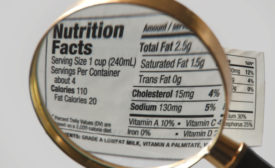Home » Keywords: » FSMA
Items Tagged with 'FSMA'
ARTICLES
Clock Ticking on FSMA Compliance
The Food Safety Modernization Act’s traceability requirements are effective in two years.
December 8, 2023
ReposiTrak Marks First, Fully Automated FSMA 204 Traceability KDE Record Creation
The world’s first no-scan receiving and shipping Key Data Element (KDE) records were assembled successfully, a milestone in food traceability.
August 25, 2023
New Year brings new import/export regulations
Industry experts offer insight into the challenges impacting the import and export of cold food and beverages, discussing everything from tariffs and governmental regulations to price increases and third-party logistics.
December 12, 2019
How FSMA impacts new product development
New product development teams must ensure their activities are aligned with the requirements of FSMA.
November 12, 2019
Registrar Corp. acquires K Squared International, Registration and Licensing Systems
Both companies provide FDA registration, U.S. agent and product listing services to domestic and foreign FDA-regulated facilities.
November 7, 2019
Food safety best practices in manufacturing development
When it comes to food safety best practices and education, AFFI offers members a plethora of tools and resources.
September 11, 2018
Report details uptick in food recalls since 2008
Six food categories accounted for the majority of food recalls in 2004, including prepared foods and meals.
April 16, 2018
Elevate your expertise in refrigerated and frozen foods with unparalleled insights and connections.
Get the latest industry updates tailored your way.
JOIN TODAY!Copyright ©2024. All Rights Reserved BNP Media.
Design, CMS, Hosting & Web Development :: ePublishing











